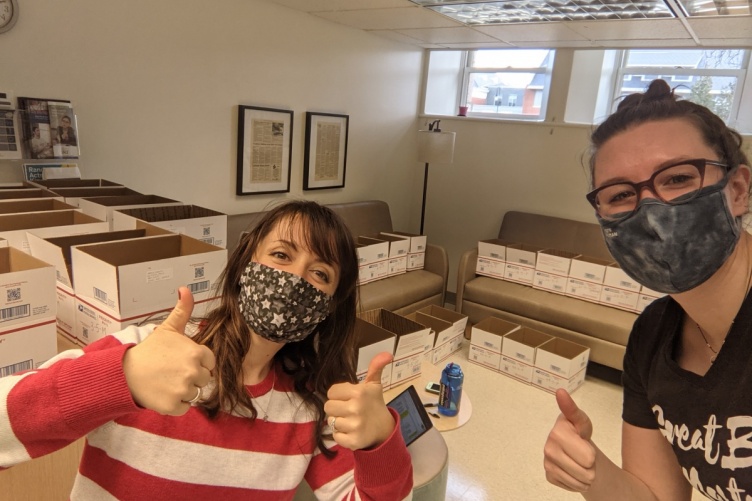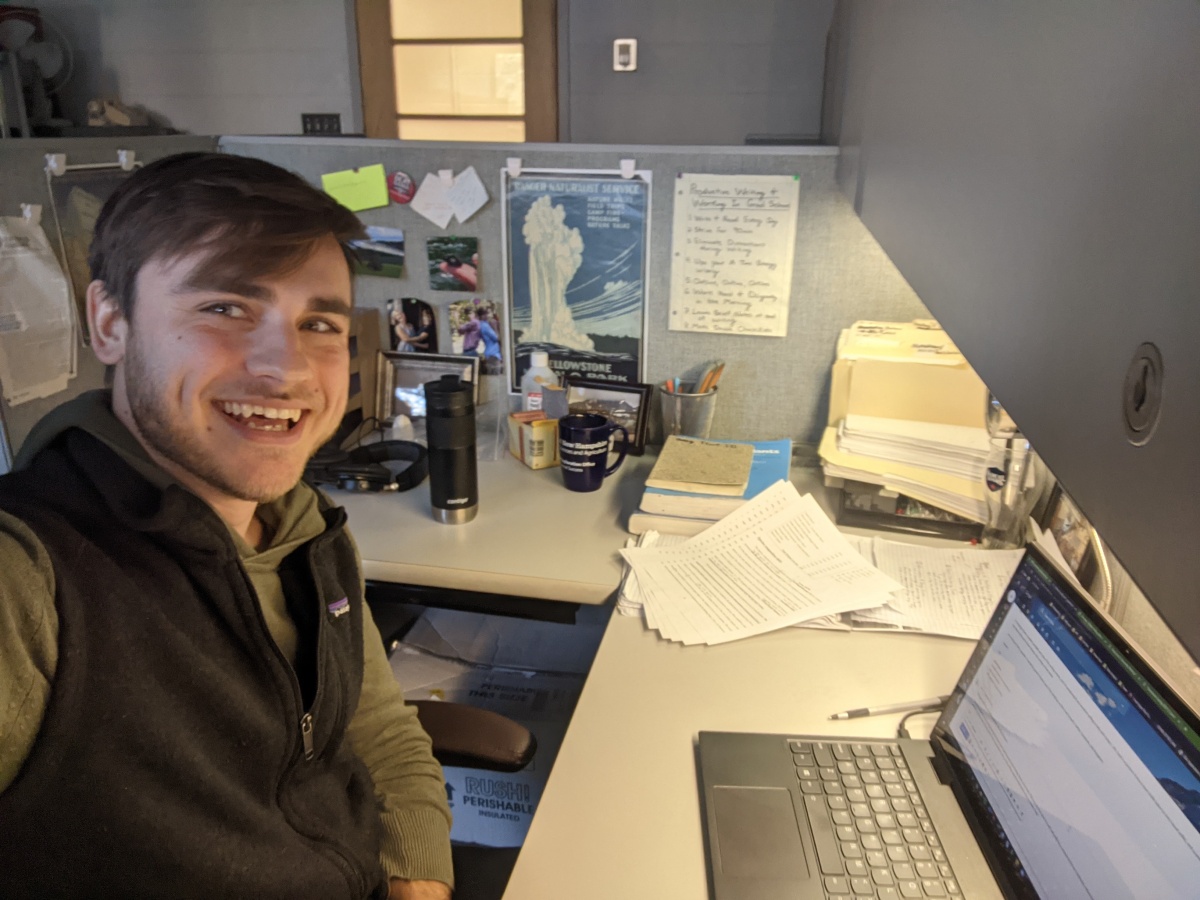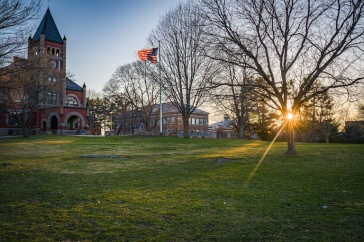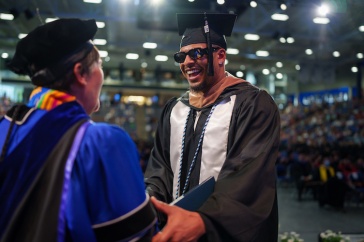
Retreat organizers Jovana Milosavljevic-Ardeljan and Caroline Kanaskie packing care packages for retreat participants.
This January, 63 graduate students gathered on Zoom for a virtual edition of the Graduate School’s 7th annual Winter Writing Retreat.
Typically, the writing retreat is a weeklong pre-semester program funded with donor support from the 603 Challenge that provides graduate students with space, resources, community, and fuel to get work done. This work could be any number of things — a thesis, dissertation, application, proposal, resume, or other piece of writing. Last year, key features of the event were designated rooms for quiet working or collaborating, as well as catered lunches from the Big Bean in Durham.
This year, due to the pandemic, the retreat was held online.
To recreate the designated rooms of past retreats, this year’s retreat featured a variety of breakout Zoom rooms for specific purposes. With these digital rooms, participants were still able to choose what they wanted throughout the retreat — be it silence or socializing.
More than just a time and to write, the retreat offers key opportunities for graduate students to receive community support. In its digital format, various sessions were offered, such as an “Academic Writing: Reducing Anxiety” workshop with Catriona Ryan of Scriptor Cube Ltd. and Zotero workshops with the UNH Library. Students could also seek feedback from faculty, including Professor Jessica Bolker from the biological science department and Professor David Howland, a former UNH writing professor who now teaches at Rutgers University. Other resources included the UNH Connors Writing Center, UNH Psychological & Counseling Services (PACS), and UNH Health & Wellness.
While many aspects of the retreat translated well to an online setting, others had to be reimagined entirely. To fuel the graduate students, the retreat organizers compiled care packages full of snacks (including homemade cookies) and UNH Graduate School swag, which students either picked up on campus or received via mail. In addition, a Canvas course was created to help give the retreat a clear structure and resource center.
The retreat, organized by graduate assistants Jovana Milosavljevic-Ardeljan and Caroline Kanaskie with faculty fellow Jessica Bolker, is now in its seventh year and grows in popularity every year. Under Milosavljevic-Ardeljan's leadership and thanks to the work of the whole Graduate School team, the retreat has become a hallmark event of UNH Graduate School. In 2015, it had 11 total attendees — by 2020, attendance grew to 70 students.
Milosavljevic-Ardeljan says donors are a big part of that success. "The Writing Retreat is a great example of how donors can make a huge impact on graduate education," she says, as donor support allows the Graduate School to offer the retreat free of charge to attendees. "Anyone who supports UNH Graduate School should know that not only are they helping individual students who attend the retreat, but they're also making an impact on the university because these kinds of programs are created with student success and retention in mind."
Kanaskie says her favorite part of the retreat is how it brings grad students together. “While we were planning the virtual retreat, I was skeptical about our ability to foster that togetherness on Zoom — but we quickly saw that wasn’t the case! It was really uplifting to see familiar faces and get to know new students too," she says.
Good Feedback
Several students shared their thoughts about the Writing Retreat:
"I attended my first retreat in January 2020. The intellectual energy was palpable, especially in the big quiet writing room. I found that the structure of each day, and the constant availability of tea and cookies, helped me to work in intensely focused spurts that were incredibly productive. And the social support and conversation with colleagues from all disciplines made any motivational problems disappear. After the pandemic hit, I was so excited to find the Grad School offering writing accountability blocks via Zoom — basically mini-retreats throughout the week. Those sessions, along with the Fall Saturday writing retreats and the retreat this winter, have kept me moving forward with my thesis writing during an unprecedentedly challenging time. That Zoom environment — where we are all safe, supported, inspired, and nurtured— has begun to feel like a real place to me. It’s absolutely priceless. — Sean Fogarty, MS Agricultural Sciences

"I look forward to the Writing Retreat every year! This year my main goal is to edit and polish up a manuscript for my freshwater wetland project, whose proposal I actually wrote during last year's writing retreat. The due date for the manuscript is soon, so the writing retreat (and the cookies) couldn't have come at a better time." — Grant McKown, MS Marine Biology

"This is my second Winter Writing Retreat and I’m so glad I joined it. During last year's in person retreat, I was able to write an entire paper that was due at the end of the week. I met a few times with Dr. Howland and his advice helped me complete the rest of my MPP papers and thesis. Needless to say, it was immensely helpful! This year, based on being at the start of a new graduate program, the virtual retreat helped me to get organized for the semester and begin the planning process of my next thesis. The daily structure helps to hold me accountable to the tasks at hand. I feel more compelled to complete the goal I set out to do for the day than when I don't have that peer support and accountability. An enormous thank you to Caroline and Jovana! The details and immense care they put into planning this retreat was evident. The Canvas site was incredibly easy to use. Having the schedule listed each day with the links to each session couldn't have been more convenient. I loved how easy it was to pop in and out of the various breakout rooms as well."
— Kiley Hoppe, Dual Masters Candidate, Carsey School of Public Policy and MS Data Analytics
-
Written By:
Lily Greenberg '21G | Grad School
















































